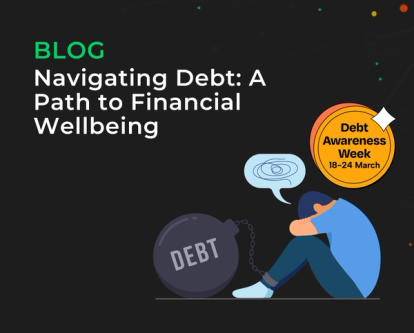Navigating Debt: A Path to Financial Wellbeing

Debt Awareness Week is a timely reminder to reflect on the significance of addressing debt and its far-reaching impact on our lives.
Firstly, it’s important to acknowledge that debt isn't just a financial burden—it can also take a toll on our relationships and overall quality of life. Moreover, the implications of debt extend beyond the immediate emotional toll; they can hinder our long-term financial goals and aspirations, preventing us from building the future we envision.
In this blog, we delve into the importance of debt awareness and proactive management, explore some strategies to cope with debt and plot a course to get out from under it.
The Debt Trap
It's important to acknowledge the ease with which individuals can fall into a debt spiral. In today's consumer-driven society, overspending and accumulating debt can happen all too easily. The prevalence of Buy Now, Pay Later (BNPL) products like Klarna in online and even physical retailers’ checkouts makes it almost too easy to trap yourself into months of micro-payments that seem small at first but quickly become unmanageable.
While credit is a valuable resource that increases financial flexibility, it must be properly used to access its full potential. Failing to understand the terms under which credit is given can lead to misuse, such as buying a new BNPL purchase before completing the previous payment plan. This leads to compounding monthly payments that can quickly exceed your capacity, leaving you in trouble.
Before we know it, we find ourselves trapped in a debt spiral, where it’s easy to feel overwhelmed and unsure of how to break free. Recognising the warning signs of excessive debt and taking proactive steps to address it is essential in avoiding the pitfalls of a debt spiral and regaining financial control.
The Benefits of Responsible Credit
This isn’t to say that using credit as a method for financial planning can’t be positive. Responsible credit usage has the power to help you realise your financial and life goals in both the long and short term.
Responsible credit usage is not the same as going into debt – regular, controlled payments to responsible credit products such as credit cards, short-term loans, and even BNPL can actually be beneficial to your credit score and financial flexibility in the long term. It’s just a question of planning.
Building a positive credit history over a sustained period can help your creditworthiness when applying for loans or mortgages whilst at the same time qualifying you for better loan terms such as lower interest rates.
By budgeting sensibly and factoring in your credit repayments, you can benefit from the positive benefits that the credit market offers, making sure to avoid the negative consequences of credit misuse.
The Way Out
Managing debt isn't just about discipline— it's an investment in your future stability and financial health. Avoiding a debt spiral and approaching credit with a mindful approach is advisable and beneficial.
Debt can be easy to fall into and hard to get out of. But this doesn’t mean you should bury your head in the sand when it comes to credit. Many resources can support you should you run into financial hardship, helping you chart a course towards economic freedom.
- For free budget support, check out MoneyHelper’s Budget Planner.
- For free debt counselling, check out StepChange





